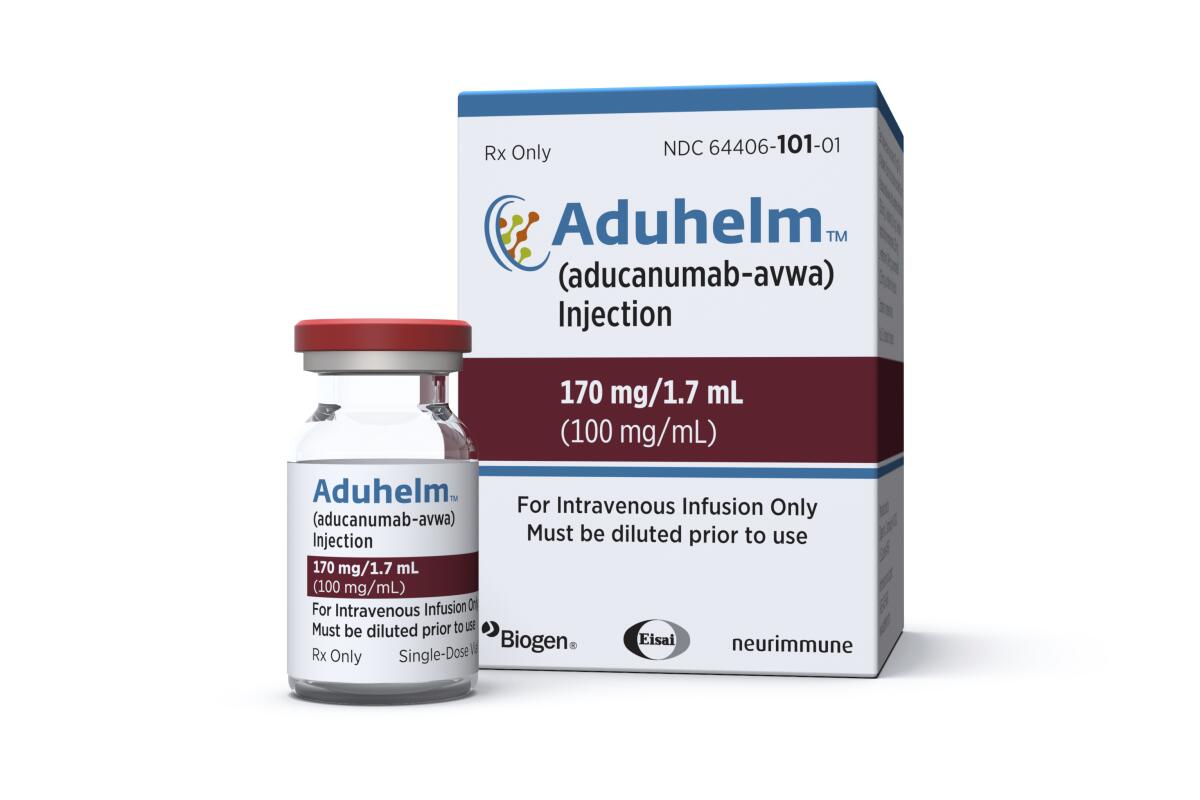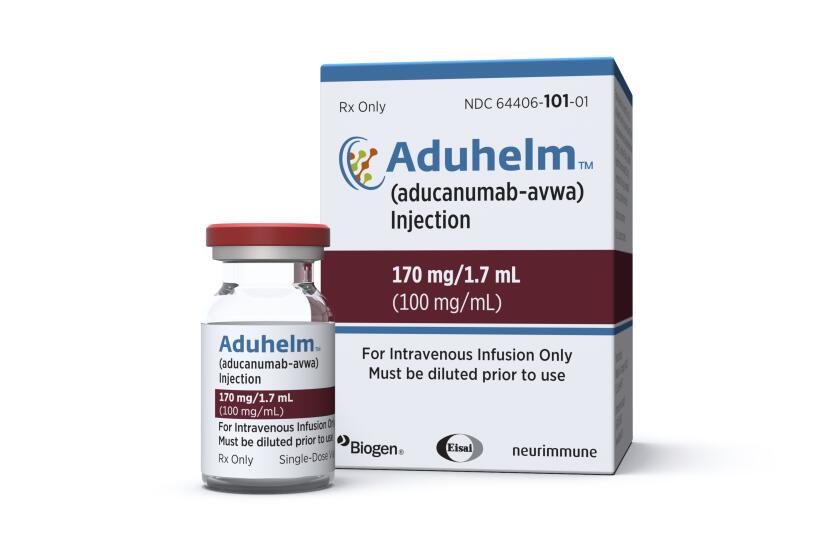Column: The FDA’s hasty approval of a new Alzheimer’s drug is looking worse than ever

Following a year in which the Food and Drug Administration meekly allowed President Trump to denigrate its integrity and undermine its judgment, it wasn’t clear that the agency could fall even lower in public and professional esteem.
It’s clear now. The FDA’s widely criticized decision on June 7 to approve the new Alzheimer’s drug Aduhelm despite a nearly complete absence of evidence that it works is looking worse and worse with every day that passes.
The latest data point underscoring the disastrous consequences of the FDA approval is related to the sky-high average price of $56,000 a year for the drug set by its U.S. manufacturer, Biogen.
The limited evidence for the efficacy of Aduhelm raises the question of whether its large impact on health spending is justified.
— Altarum consultants
According to a report by the nonprofit healthcare consulting organization Altarum, if the drug is prescribed for only 1 million patients a year — the low end of Biogen’s marketing expectations — by the mid-2020s it will account for more than 1% of all national health spending. In 2025, for instance, when total spending is expected to reach abut $5.3 trillion, $57 billion of that will be spent on Aduhelm.
The drug will increase all prescription drug spending by 8% and non-retail drug spending — that is, for drugs that have to be administered in hospitals or doctors’ offices — by 25%. If the patient caseload doubles, so will those figures. And the FDA’s approval would allow Aduhelm to be prescribed for any of the nation’s Alzheimer’s patients, who currently number more than 6 million.
Get the latest from Michael Hiltzik
Commentary on economics and more from a Pulitzer Prize winner.
You may occasionally receive promotional content from the Los Angeles Times.
That will impose higher costs on 56 million Americans enrolled in Medicare Part B even if they don’t suffer from Alzheimer’s, the Kaiser Family Foundation observes. That’s because Medicare is required by law to cover all prescription medicines approved by the FDA. Part B premiums rise with Medicare’s expenses, so the higher spending on Adulhelm will hit all premium payers in the pocketbook.
If 1 million Part B members take Aduhelm, the program’s 80% share of the drug’s cost would come to nearly $45 billion, or well more than the $37 billion Medicare paid for all Part B drugs in 2019.
Many Medicare patients taking the drug will be hard-pressed to afford it, KFF notes. Their 20%, uncapped share of Part B drug and services costs would mean an average bill of $11,200 per year for the drug. That’s almost 40% of the $29,650 median income of Medicare Part B members.
It gets worse. Altarum’s estimates don’t encompass the ancillary costs that will be associated with taking Aduhelm. Because the clinical trials revealed that about 30% of patients receiving a high dose of the drug experienced brain swelling, patients will have to undergo regular MRI tests to watch out for this dangerous side effect. They’ll have to pay their share of that, too.
How did the FDA got browbeaten into approving an Alzheimer’s drug that may not work?
This isn’t the first time that a new drug has threatened to break the national healthcare bank. The best comparison may be the hepatitis-C drugs Sovaldi and Harvoni, which were priced by their developer, Gilead, at $84,000 and nearly $100,000 per year, respectively.
Those drugs drove annual growth in retail prescription spending from 2.2% in 2013 to 13.5% in 2014, after their introduction, Altarum says.
But there are differences. Sovaldi and Harvoni cured more than 90% of hepatitis-C patients after a single round of treatment, so the spending on any patient lasted less than a year; measuring their cost against the cost of treating hepatitis-C patients indefinitely made the cost-benefit balance obvious. Indeed, by 2016, when most patients had been treated, the prescription growth rate fell back to 1.7%,
But Aduhelm is neither a cure nor a one-time treatment. “Aduhelm is to be administered repeatedly throughout the patient’s lifetime or until the patient and his or her physician elect to discontinue treatment,” Altarum explains. “The resultant growth in spending will therefore be sustained for the foreseeable future.”
The organization’s bottom line: “The limited evidence for the efficacy of Aduhelm raises the question of whether its large impact on health spending is justified.”
As bad as the FDA’s decision is looking today, it didn’t start out as a widely praised action, either. As we reported last week, one member of the FDA scientific advisory committee that had examined results from the drug’s clinical trials pronounced the action “probably the worst drug approval decision in recent U.S. history” in a letter resigning from the committee.
The 11-member committee had advised almost unanimously against the approval. Two other members also resigned after the FDA ignored the panel’s recommendation.
Jane Blumenfeld isn’t sure when or how she contracted hepatitis C.
Alzheimer’s specialists are concerned about the FDA decision for more than financial reasons. They fear that the existence of a drug with the FDA’s imprimatur, as questionable as it is, will interfere with efforts to develop and test other treatments that may turn out to be more promising.
Patients may be reluctant to enroll in trials of alternative drugs instead of taking Aduhelm, for example. And researchers trying to recruit trial subjects will have to reject anyone who has been treated with Aduhelm, because it will be difficult, if not impossible, to determine whether a given result is due to Aduhelm or the new drug.
The longest-lasting effect, however, may be on the FDA’s reputation for imposing rigorous safety and efficacy standards. The pharmaceutical industry has long groused about the agency’s painstaking approval process, even though it has given the American drug market an image as the safest in the world.
The drugmakers have consistently pushed for faster approvals and the acceptance of ever more sketchy evidence from clinical trials.
Aaron S. Kesselheim, the Harvard professor who delivered that damning judgment about the FDA approval before resigning from its advisory panel, has called for the creation of a new agency to oversee drug approvals, presumably inoculated from pressure from Big Pharma.
The FDA’s approval of a high-priced, apparently low-value drug that will yield billions of dollars in profits for its manufacturer may even spur Congress finally to take America’s drug-price crisis in hand and find a solution. That could be the silver lining around the cloud of the FDA’s action.
But it will be a shame that an agency that reigned as a bulwark against unsafe and ineffective drugs since its founding in 1906 had to fall so low to achieve that goal.
More to Read
Get the latest from Michael Hiltzik
Commentary on economics and more from a Pulitzer Prize winner.
You may occasionally receive promotional content from the Los Angeles Times.








